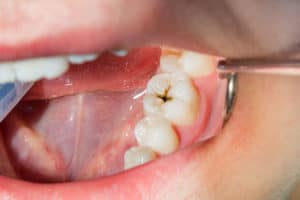Dental Caries and How They Affect Your Health
Dental caries is the more formal term for dental cavities. We’ve all been warned about cavities since childhood as part of our oral health education–it’s how we traditionally teach children about the importance of brushing and flossing and overall dental hygiene. However, as an adult you may have a few remaining questions, like what are dental caries exactly and how do cavities/caries affect your health? It’s more complex than you might think, so let’s dig into the world of dental caries and talk about what they mean to you.
What are Dental Caries?
Dental caries, again more popularly known as cavities or dental cavities, are a common oral health affliction. They are a form of tooth decay, brought about when bacteria build up in the plaque layer on the surface of the tooth. The waste these bacteria produce is acidic, and if it builds up over time it can erode the enamel and dentin of the tooth and create a cavity which is in turn prone to further damage or infection. If caught early, cavities can be reversed. At the start, they just look like white spots on the teeth, and fluoride treatments can allow your tooth to remineralize and repair the damage. However, if they get to the point that an actual pit or hole forms in the enamel, you’ll need to see a dentist for treatment.
What Causes Dental Caries?
So what causes dental caries? Well ultimately they’re caused by bacteria building up and their acidic waste damaging the surface of the tooth, but a lot of things can contribute to that. Contributing factors to dental caries can include the following:
- Family history can contribute to oral health issues including dental caries
- Fluoride exposure, particularly during the formative years, may determine in part your proclivity to dental caries
- Dietary habits, especially sugar consumption, may make you more prone to dental caries
- The morphology and spacing of your teeth may make you more likely to have dental caries. Teeth with deep grooves or teeth which overlap are more likely to get caries or cavities.
- Overall medical history is a contributing factor. Some medical conditions or treatments–chemotherapy is a good example–can weaken your teeth and make you more prone to cavities/caries. Your doctor can tell you more about your individual condition.
Symptoms of Dental Caries
So how do you know if you have cavities or caries? There are a number of signs that a problem may be developing or maybe in place, and we should all be aware of them.
- A chalky white spot on the surface of the tooth is the first sign of trouble. If you see one, please let your dentist know as treatment is still relatively easy at this stage.
- The spot will grow larger and darker as it becomes a cavity. Once it reaches the point that the enamel and/or dentin have taken damage, the damage is irreversible and will require treatment by a dentist.
- The cavity may develop into a larger hole at this point, when that happens another set of symptoms ensue, these include heat and cold sensitivity, tooth pain, and pain while chewing or talking.
Effects and Treatment
If left untreated, dental caries can result in tooth loss or worse. Treatment will depend on how far the damage has progressed and may include anything from fluoride treatment to a simple filling to a crown or replacement tooth. Again we should note that treatment is a lot easier the earlier it begins, so if you suspect you have a cavity please contact your dentist for an exam. They can assess your needs and suggest treatment from there.
Dental caries can be a problem, but if we understand how they start and what causes them we can avoid the worst. A good brushing and flossing practice, healthy diet, and regular dental exams can go a long way towards preventing the worst.
